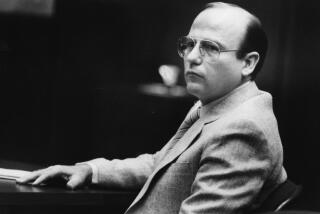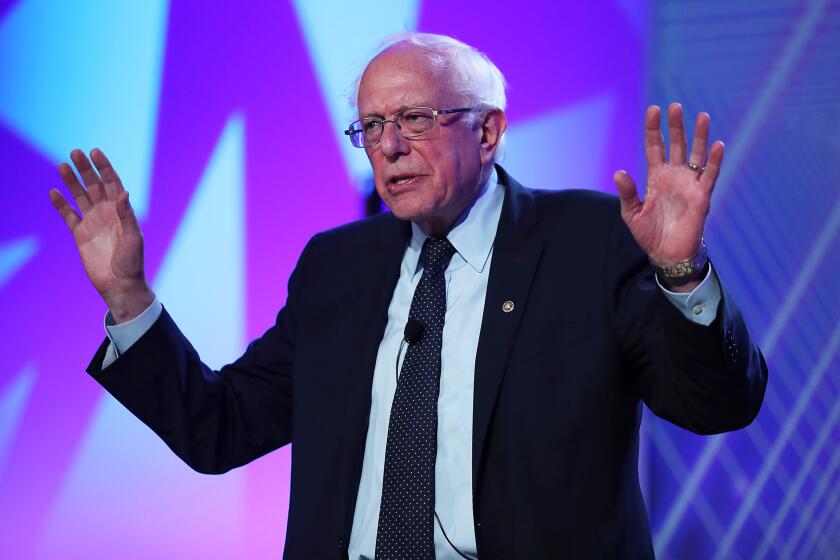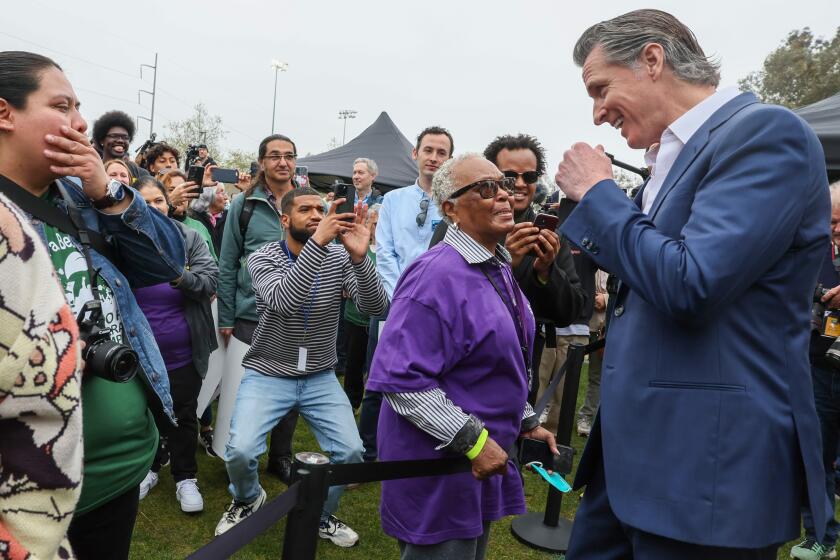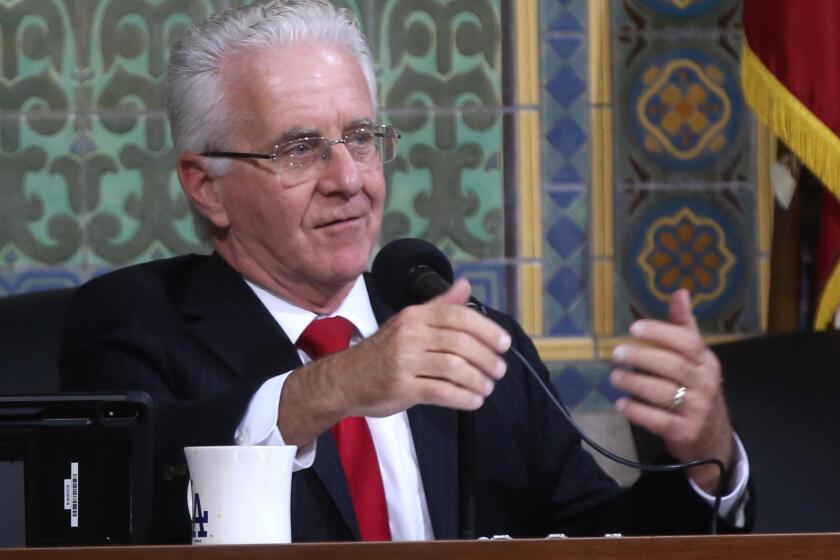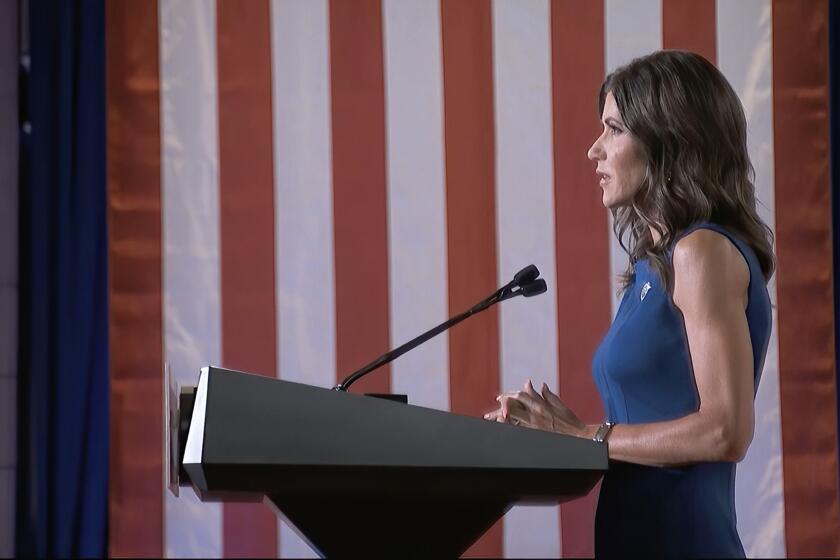$36 Million Buys Clout in the Capitol : Lobbies Set 6-Month Spending Record; For Some, It’s a Bargain
A record $36 million was spent on lobbying the Legislature during the first half of 1985, and for many interest groups, it was a bargain.
The Assn. of California Insurance Cos., for instance, paid out more than $280,000 in a successful campaign for passage of a mandatory seat belt law, which eventually will require auto makers to install automatic crash protection equipment, such as air bags, in every car sold in the state.
Californians will have to begin buckling up on Jan. 1--a requirement expected to save 1,000 lives each year and reduce expenses for automobile insurers.
Spending to influence legislation has risen so much in recent years that some consumer and public interest groups fear that they are being priced out of the lobbying market.
Yet the big spenders do not always get what they are asking for.
For example, the Irvine Co., Orange County’s largest private landowner with huge investments in shopping centers and other businesses, spent $340,419 on lobbying during the first six months of the year. That made it the sixth largest on the list of big spenders, according to figures released last week by the Fair Political Practices Commission, the state’s watchdog agency on political financing.
Deep Pocket Defeat
The Irvine Co.--along with the insurance group and several other organizations--suffered a big defeat, however, on the so-called deep pockets issue.
One of the most heavily contested measures before lawmakers this year, the deep pockets bill would have changed liability laws that allow large injury case judgments against big companies and private agencies, even if they are only marginally at fault.
The California Trial Lawyers Assn., which spent nearly $184,000 on lobbying in six months, ended up on the winning side of the deep pockets fight. Trial lawyers generally collect between a third and a quarter of judgments in injury cases and would have received reduced fees if liability had been limited.
This year’s lobbying spending spree also was boosted by rival interest groups fighting over the state’s unitary tax system for calculating the amount owed the state by multinational corporations that do business in California. One version of the proposal to change the unitary tax would have provided a $250-million tax break to some of the world’s largest business firms.
The fight over the unitary tax, which will continue to be played out during next year’s legislative session, saw substantial lobbyist spending by Shell Oil Co. ($97,403), TRW Inc. ($46,600), Sony Co. ($38,000), Crocker Bank ($22,983), Coca Cola ($22,960) and IBM ($13,195).
Many of the lobbyists and the groups that employ them are reluctant to crow about their successes or advertise their defeats.
No ‘Gloating’
“We don’t want to come off as gloating,” said an official from Pacific Bell.
Pacific Telesis Group, a holding company that encompasses Pacific Bell, Pac Tel Communications, Pac Tel Mobile Access, Pac Tel Publishing, Nevada Bell and Pacific Telesis International, was second on the Fair Political Practices Commission list, with reported spending of nearly $2 million in lobbying between January and June. Most was spent on arguing the case for two large rate increases before the state Public Utilities Commission. The company spent, however, $231,000 on lobbying legislators.
This was almost as much as the total spent ($262,000) by all the self-described public-interest groups, such as Common Cause and the Consumers Union.
Another utility, Pacific Gas & Electric Co., was by far the biggest spender, with a reported $5.2 million-plus. The company said that 97% of this went for its rate hearings before the utilities commission.
The company spent only $114,500 to lobby lawmakers, said the company’s spokesman, Clyde E. Walthall.
The top-earning lobbying firm for the first half of 1985 was A-K Associates, which collected $534,010 in fees. The firm’s six lobbyists serve about 30 clients.
They include ambulance associations, pathologists, the Tobacco Institute, California Dental Service and Scientific Games, a major state lottery supplier. “We represent all our clients in the same way, whether it be for a high fee or a low fee,” Thomas S. Konovaloff, an A-K partner, said.
No Press Contact
Advocation Inc. earned $488,665 to rank as the No. 2 lobbying firm, on the basis of fees received. The firm represents a large number of influential clients, including the Irvine Co., 7-Eleven Stores, the plastic pipe industry, powerful Central Valley growers and Pearle Health Services Inc., which wants to open its franchise eyeglass outlets in California.
“I don’t talk to the press. I have never talked to the press in this town,” Advocation owner Donald K. BrOwn said. “I am prevented by contract from talking to the press.”
Some lobbyists emphasized their successes.
“I was very pleased with my results,” said James D. Garibaldi, 79, the dean of the Sacramento lobbying corps, who has been lobbying since 1945. His firm was paid $241,000 for its lobbying efforts through June of this year, to rank No. 8. “Remember,” Garibaldi said, “I’m a one-man operation.”
Garibaldi takes credit for the successful passage of a measure, signed by Gov. George Deukmejian, that extends the harness and quarter horse racing seasons in Southern California.
He also was successful in pushing through a bill that would have curbed bargain sales of prestige European wines and champagnes brought into California through a flourishing gray market.
Deukmejian, agreeing with liquor retailers, grocers and consumer groups, vetoed it, however, as unfair.
‘People Have a Right’
Consumer and other public-interest groups are complaining that more and more they are outgunned by big-spending private interests.
“People have a right to petition their government and a right to organize to lobby and to influence the legislative process,” said Walter Zelman, director of California Common Cause.
“What is troublesome is the imbalance--the escalation in lobbying costs is being driven up by special interest groups--and that spending is not in any way matched by the increases in consumer and public-interest spending. The imbalance has always existed, but it’s getting worse than ever.”
Zelman’s resentment is shared by some of the big-spending lobbyists themselves.
“You’ve got some interests that spend a terrific amount of money . . . hiring high-priced lobbyists,” said a lobbyist for a major corporation, who agreed to be interviewed only if he was not identified. “Those people make a lot of campaign contributions, and their lobbying operation is limited to working a few (legislators) who get the money and distribute it. I’m talking about the leadership in both houses.”
Without the clout of heavy campaign contributions, other lobbyists must develop contacts in the Legislature, with staff members as well as the legislators themselves, he said.
“I take secretaries to lunch,” the lobbyist said. “I have discovered on a few occasions that it has paid off. In a tight lobbying situation, you need to see that legislator for a couple of minutes, and if that secretary doesn’t want you to see that guy, you are not going to see them.”
Other lobbyists contend that they suffer from a bad public image that is not deserved.
Wayne Wilson, a lobbyist for insurance companies, said, “Well over 95% of the money spent on lobbying goes for salaries, travel expenses for lobbyists, and not for buying lunch for legislators.”
SPENDING BY GROUP Lobbyist spending to influence legislation in 1985 can be broken into these groups, according to a state Fair Political Practices Commission report:
Business $14,649,000 Utilities* 8,653,000 Health 3,010,000 Government 2,442,000 Education 2,328,000 Public Employees 1,056,000 Labor 699,000 Agriculture 654,000 Legal 571,000 Consumer 262,000 Political Groups 31,122
*Includes money spent in rate hearings. THE COST OF LOBBYING A report from the state Fair Political Practices Commission lists these lobbyist employers as the biggest spenders during the 1985 legislative session:
Filer City Industry Pacific Gas & Elec.* San Fran. Utilities Pacific Telesis Group* San Fran. Utilities Western Oil & Gas Los Angeles Oil/Gas Calif. Medical Assn. San Fran. Health Chevron USA, Inc. San Fran. Oil/Gas Irvine Co. Npt. Beach Real Estate Calif Tax Reduction Movement Npt. Beach Misc. Assn. of Calif. Insurance Sacramento Finance Calif. Teachers Assn. Burlingame Education Calif. State Employee Assn. Sacramento Employees Calif. Business Council Sacramento Misc. Southern Calif. Gas* Los Angeles Utilities Atlantic Richfield Los Angeles Oil/Gas Los Angeles County Los Angeles Government Calif. Building Industry Assn. Sacramento Trade Californians Against Waste Sacramento Misc. Calif. Manufacturers Assn. Sacramento Industrial Calif. Assn. of Realtors Los Angeles Real Estate San Diego Gas & Elec.* San Diego Utilities Calif. Teamsters Sacramento Labor Assn. of School Adminstrators Burlingame Education City of Los Angeles Los Angeles Government Calif. Bankers Assn. San Fran. Finance Calif. Trial Lawyers Assn. Sacramento Legal County Supervisors Assn. Sacramento Local Supervisors
Filer Amount Pacific Gas & Elec.* $5,246,061 Pacific Telesis Group* 1,952,731 Western Oil & Gas 766,543 Calif. Medical Assn. 470,029 Chevron USA, Inc. 346,764 Irvine Co. 340,419 Calif Tax Reduction Movement 339,982 Assn. of Calif. Insurance 282,049 Calif. Teachers Assn. 277,963 Calif. State Employee Assn. 245,332 Calif. Business Council 234,460 Southern Calif. Gas* 219,013 Atlantic Richfield 217,450 Los Angeles County 216,215 Calif. Building Industry Assn. 212,653 Californians Against Waste 211,912 Calif. Manufacturers Assn. 204,700 Calif. Assn. of Realtors 193,190 San Diego Gas & Elec.* 190,970 Calif. Teamsters 187,086 Assn. of School Adminstrators 186,937 City of Los Angeles 186,649 Calif. Bankers Assn. 186,373 Calif. Trial Lawyers Assn. 183,872 County Supervisors Assn. 179,502
*Payments by utilities include money spent in connection with legally required rate proceedings before the Public Utilities Commission. Times staff writers Leo Wolinsky and Carl Ingram contributed to this story.
More to Read
Start your day right
Sign up for Essential California for news, features and recommendations from the L.A. Times and beyond in your inbox six days a week.
You may occasionally receive promotional content from the Los Angeles Times.
